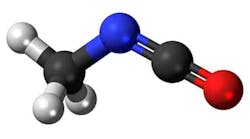The U.S. Department of Labor's Occupational Safety and Health Administration cited Bremer Manufacturing with three safety violations and proposed penalties totaling $81,900 following a May incident in which a worker was found unresponsive, and later died. The 55-year-old man had been employed at the Elkhart Lake, WI, foundry for 38 years, including in a sand molding operation that involved exposure to resin-containing isocyanates.
A subsequent OSHA inspection led to the conclusion that the foundry failed to train workers to understand the physical and health hazards of chemicals in the workplace.
"This inspection focused on employees who work with hazardous chemicals including a resin-containing isocyanate, which can cause employee sensitization," said Robert Bonack, OSHA's area director in Appleton, WI. "Isocyanates can cause chest tightness, trouble breathing and irritation to the lungs, eyes, nose, throat and skin. Even when exposure limits are below permissible levels, workers can experience health consequences, especially if they have other health risks and are exposed to chemicals on a routine basis.”
Bonack emphasized that employers are responsible for training employees on the physical and health hazards of working with chemicals.
Isocyanates are constituents to polyurethane products, including sand binders.
Bremer Manufacturing produces aluminum sand castings and air-set castings (for low-volume production and prototypes.) Its customers include small and large engine manufacturing, appliance manufacturing, transportation, construction, and several others.
OSHA cited Bremer with one willful, one repeat, and one serious health violation. Willful violations are those committed with “intentional, knowing, or voluntary disregard for the law's requirement, or with plain indifference to employee safety and health.” The willful violation concerns Bremer Manufacturing’s failure to train workers in chemical hazards according to guidelines documented by OSHA’s National Emphasis Program for Occupational Exposure to Isocyanates.
The “repeat” violation concerns the foundry’s failure to train employees on the physical and health hazards associated with formaldehyde. The company was cited for the same violation in 2010.
The “serious” violation concerns the foundry’s failure to establish a written respiratory protection program.
Bremer Manufacturing has not commented on the citations. It was allowed 15 days to pay the $81,900 fines, request an informal conference with OSHA's area director, or contest the findings before the independent Occupational Safety and Health Review Commission.









